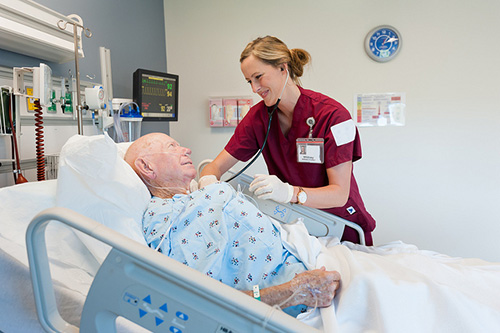Nurses help patients navigate the maze of fragmented cancer care
Cancer treatments have changed immensely in the last few decades. Awareness of prevention has increased. Treatments are more effective and aggressive. Screenings have improved in effectiveness and utilization. “Living with cancer” has become a reality for many patients. But navigating chemotherapy, pain management, nutrition, finances and insurance can be a complicated journey both during and after treatment, and is a daunting task in an already difficult and exhausting situation.
“Getting holistic care during cancer treatment requires a great amount of organization, energy and time,” said Maxine Hinze, Ph.D., RN, CNL, clinical assistant professor at the Texas A&M Health Science Center College of Nursing. “Coordinating the many components requires a great amount of knowledge and energy – something that is often difficult for the patient to handle on their own.”
Hinze has experience treating cancer patients as both a nurse and a family member. Three of her immediate family members have been diagnosed with cancer in the past three years. Her personal and professional experiences have enriched each other and inspired her approach to educating the next generation of nurses.
“I’ve seen the battle from both sides of health care and I can say it’s imperative that patients and their families get help to get through the disjointed relationships that make up the process of cancer treatment,” Hinze said. “Cancer care is often fragmented care. No single person sees the complete picture with the exception of the patient, and they may not be equipped to recognize problems and/or solutions.”

What is fragmented care? Hinze explains that it’s the segmented community of experts and caretakers involved with treating a cancer patient. Cancer care has become more complicated and challenging to deliver because of changing clinical guidelines, multi-disciplinary approaches to evaluations, specialist coordination, health record data, disparities in information technology use and financial coordination.
“It takes a team to treat cancer – and a person to pull that team together, nurses are often at the center of this,” she said. “We teach our students that, as nurses, they are the last line of defense for patients and they must be holistic providers by being cognizant of what they do and how they do it.”
After all, cancer patients should be focused on fighting for their lives, not fighting a fragmented system. Nurses can help patients through the intricacies of the system and concentrate on what really matters: beating cancer.
The Texas A&M College of Nursing is teaching their students how to help patients manage their own health care. Understanding that cancer treatment treats more than “just cancer” is the first component of this, but also making sure that patients are the most knowledgeable member of their care team by becoming advocates for themselves. Nurses are key to help educate and inform patients and also to act as advocates on the patients’ behalf.
Tying the whole picture together can be difficult; so much so that some hospitals and insurance providers are even hiring “nurse navigators” to help patients through the long process. The fragmented care labyrinth is so demanding that national organizations have formed, like the Academy of Oncology Nurse and Patient Navigators, which now has more than 5,000 navigator members.
How can patients and their families act as their own advocates? Hinze suggests always having a support person with the patient, and if possible having the same support person throughout the process. “This is an exhausting time, and having someone there with more energy can be a huge help,” she explained. “A support person is necessary not only for emotional and physical support, but for actually getting through the weeds of the system.”
Hinze also suggested going to each appointment armed with a list of written questions. “Whether it’s on a scrap of paper, your phone, a notebook – it doesn’t matter, but writing them down prevents you from forgetting,” Hinze said. “This seems like a simple, even silly thing, but it’s amazing what you can forget when you’re stressed and sitting in front of your physician or nurse.”
In the end, she says, patients need to be the most knowledgeable person about their care and cancer treatment. “We want to teach nurses to educate patients so patients can be their own best advocate and we want to help patients tie that whole picture together,” Hinze said. “As nurses, we want to be part of the solution to fragmented and diverse care.”
Media contact: media@tamu.edu


